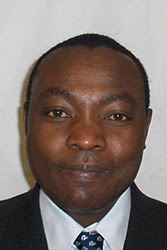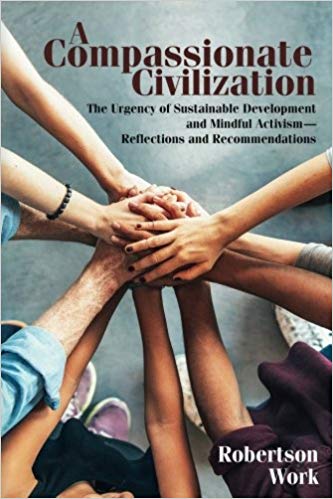
Cosmas Gitta


Robertson Work joins a growing number of public intellectuals who warn of existential threats to humanity and the planet, while highlighting the unprecedented opportunities available to improve our life on a healthy planet. In the book A Compassionate Civilization, Work contends that the “world stands at the crossroads of interlocking crises of colossal dangers and exhilarating possibilities”. He then makes a prophetic call for a compassionate world order—one equipped with systems, policies and institutions to address the challenges humanity and the earth face with urgency and resolve.
The book is a fountain of wisdom for individuals and social movements working to foster social and economic justice, environmental sustainability, women’s empowerment, democratic governance and other human rights around the world. Beyond overly optimistic appeals for all human beings to be nice to each other and to the planet, Work presents a well-thought-out action plan for global citizens to nurture a culture of compassion that invigorates human fellowship. What ails humanity in Work’s view is the breakdown of human solidarity due to oligarchy, misogyny, systemic poverty, racism, intolerance and violence. Based on that diagnosis, Work employs a unique literary style to engage readers in a “multilogue” to help repair fractured human relationships and corrupt institutions.
The most insightful aspects of the book are the reflections, ideals, as well as disappointments and heartaches resulting from the author’s work in over 50 countries and close to 30 years of living and working for the Institute of Cultural Affairs and the United Nations in Malaysia, South Korea, Jamaica, Venezuela, and the United States.
Like commentators such as Robert B. Reich and Thom Hartmann who are wary of super capitalism or corporate dominance and current threats to the liberal world order, Work denounces the existing economic system for “condemning masses to a life of grinding poverty and for favoring a few people to a life of opulence”. He also faults this system for enabling powerful individuals and corporations to erode democratic institutions to advance their own interests.
The frank lessons one draws from A Compassionate Civilization are that economic and legal fixes are important but not enough to improve the human condition. Equally needed are personal and civic virtues to respect women and to avoid an overly masculine culture that exalts harmful competition, violence, warfare and the destruction of the natural environment.
Work’s prudential roadmap for political and economic revolutionary change is brilliant for it endorses the 17 Sustainable Development Goals as the framework for international collective action to improve the human condition. Rather than hailing military might, Work grounds a plausible human destiny on civic and social virtues promoted by Mahatma Gandhi, Nelson Mandela, the Dalai Lama, Pope Francis, and other inspirational leaders. In appreciation of technological advances, Work allocates the task to build a compassionate civilization to innovative leaders and ordinary global citizens organized into a vast online network or a movement-of-movements.
In prose and poetry, Work makes a persuasive argument that mammals are wired to feel empathy towards their own kind. To him, compassion is ontological, biological and sociological. As such, what the movement-of-movements must strive to overcome is the distortion of human nature that accounts for violence, warfare, poverty and injustice due to negative emotions of fear, anger, hatred, greed, ignorance, jealousy and pride. Following this logic, readers of the book might find it hard to resist doing their share to build a compassionate civilization to align the world order with our authentic human nature—in line with impulses recently displayed by divers from various nations who rushed to rescue 12 boys and their football coach from a flooded cave in Thailand. The book also makes it imperative to embrace the civic dimension of such selfless compassion in support of humane policies, including the provision of food stamps, universal healthcare, affordable housing, job training, affirmative action and environmental stewardship.
In sum, A Compassionate Civilization gives the reader a glimpse into a desirable world order by a man who went from a life bound by vows of poverty, chastity and obedience to alleviate the suffering of millions of the poor in slums and rural villages, to being part of a secular global movement of those who care. The book is also an open invitation to join such a caring movement to bring about the bright future that Work promises to his two grandchildren, Phoenix and Mariela and all children around the world to whom he dedicates his book.
……………………………………………………………………………………..
Author of A Compassionate Civilization, Robertson Work, is adjunct professor of innovative leadership at NYU Wagner Graduate School of Public Service, UN consultant, Fulbright specialist, public speaker, and social activist. He is former UNDP principal policy adviser on decentralized governance, and executive director of the Institute of Cultural Affairs in three countries. He has worked in over 50 countries and contributed to 11 books.
The book can be ordered at: https://www.amazon.com/dp/1546972617 and through local bookstores and IngramSpark. The author’s blog site is: http://compassionatecivilization.blogspot.com/
About the Author
Dr. Cosmas Gitta is a senior UN consultant and the former Assistant Director for Policy and UN Affairs at the UN Office for South-South Cooperation, where he oversaw the convening of various intergovernmental and interagency forums as well as the preparation of related reports and studies, including the biennial reports of the Secretary-General on the state of South-South cooperation. He was Editor-in-Chief of the magazine Southern Innovator and an e-newsletter, Development Challenges: South-South Solutions both of which are media to share information on development related innovations with partners around the world. He was for many years Managing Editor of Cooperation South, a print and electronic development journal promoting collaboration among developing countries. Mr. Gitta holds a PhD in international and comparative education from Columbia University and he has lectured on human rights education at his alma mater, and on a range of other subjects at various campuses of the City University of New York.

Nice piece of work. Congs.Dr. Gitta